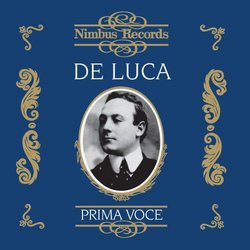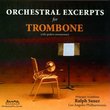| All Artists: Vincenzo Bellini, Eugeno Diaz de la Pena, Gaetano Donizetti, Enrico de Leva, Amilcare Ponchielli, Giacomo Puccini, Romilli, Gioachino Rossini, Giuseppe Verdi, Ermanno Wolf-Ferrari, Giulio Setti, Amelita Galli-Curci, Beniamino Gigli, Enrico Caruso, Giuseppe de Luca Title: De Luca: Prima Voce Members Wishing: 0 Total Copies: 0 Label: Nimbus Records Original Release Date: 1/1/1990 Re-Release Date: 12/2/1992 Genres: Pop, Classical Styles: Vocal Pop, Opera & Classical Vocal, Historical Periods, Modern, 20th, & 21st Century Number of Discs: 1 SwapaCD Credits: 1 UPCs: 083603781521, 710357781520 |
Search - Vincenzo Bellini, Eugeno Diaz de la Pena, Gaetano Donizetti :: De Luca: Prima Voce
 | Vincenzo Bellini, Eugeno Diaz de la Pena, Gaetano Donizetti De Luca: Prima Voce Genres: Pop, Classical
|
Larger Image |
CD DetailsSimilar CDs |
CD ReviewsOne of the Great Baritones and a Model Singer Doug - Haydn Fan | California | 12/05/2008 (5 out of 5 stars) "This fine production gives a nice survey of the art of Guiseppe de Luca, with examples from both his acoustic recordings (1-10) and electrical recordings (11-18). The famous baritone had made 66 records for the Gramophone and Typewriter company and later Fonotipia in Europe before his Met debut as Figaro in November 25, 1915. Thereafter De Luca was a Victor artist, and the majority of these recordings are Victors. (The first three were done for Fonotipia in 1907 - the earlier G&T's from 1902-1904 being somewhat too primitive in sound for most listeners.) De Luca was a great partner and producer Norman White also includes five duets with major stars Caruso, Gigli and Galli-Curci. Over the course of his career de Luca made more than 350 recordings, and over 150 were published. There are also two complete concert performances, three sound motion pictures shorts, and nine radio broadcasts. Giuseppe de Luca is a major historic figure in opera. As a youth growing up in Rome he sang in the choir of St. Peter's Cathedral, then, after his voice broke, ended up studying with Vinceslao Persichini, the teacher of Battistini. When de Luca began singing professionally he made friends with another up and coming singer in Genoa, a slighty older singer, a tenor from Naples named Enrico Caruso; the two became lifelong friends. By the time he was 25 de Luca had so impressed his contemporaries that he was given responsiblity for permiering the baritone role in "Adriana Lecouvreur", this with Caruso and under the baton of Toscanini. The next year the still very young de Luca was tapped for creating the role of Sharpless in Puccini's "Madama Butterfly" - de Luca considered this the greatest honor of his long and illustrious career. In hindsight it's astonishing how many important premieres this very young artist was accorded: he was the baritone in the first performance of Giordano's "Siberia", Sancho Panza with Chaliapin as the Don in Massenet's "Don Quichotte", and several others. Later when he was an established veteran he played Pacquiro in the ill-destined Granados' "Goyescas"; as well as several others - notably the plum starring role of Gianni Schicchi! Sadly, we have no recoding of this role, nor anything from Butterfly or Goyescas. De Luca was a major baritone at the Met - THE major baritone - for over twenty years, from 1915 through 1935, and during this period he made over two hundred masters for Victor, 74 of which were issued on 78's, fifteen of which can be heard on this Cd. We have a number of outstanding duets with other singers as well, as Victor would match de Luca with such major singers as Ponselle, Martinelli, Rethberg, Lauri-Volpi, Pons, Bori, Farrar. The earliest recordings on this Cd made for Fonotipia in 1907 showcase de Luca's fine cantabile line, and elegance of emission, though they also are a tad understated, as well as a bit too edited ,at least by modern standards in these selections. Nigel Douglas, in his superb and charming book on singers, "Legendary Voices" Legendary Voices, describes these earlier recordings of de Luca in the role of Germont: "As the dignified figure of Germont pere de Luca was probably at his best some twenty years after he made this recording." Later he would make wonderful duets with Galli-Curci from "La Traviata", as well as two more recordings of "Di Provenza il mar" in 1917 and 1929. Although we do not have this Calli-Curci/de Lucaon duet on this Cd, we can hear them singing with extraordinary melliflousness in two duets from Rigoletto. The 1917 Victor recording of the all too famous "Largo al factotum" is much brighter and more incisive, and from this point on de Luca begins setting very high standards of singing, giving not only examples of Buffo singing, as in his duet with Caruso, but also object lessons in how to express all the drama of an aria using restraint and nobility, as in his performance from "Don Carlos" where he laments the death of Rodrigo. De Luca may be 'old school' in comparison to more recent baritones: his emphasis is on holding his melodic line and never failing to sing, rather than break into momentary excursions of harshness for effect. Yet unlike his contemporary Mario Ancona, another baritone who also sang in this style, de Luca never suggests he is only a singer - with de Luca the words do matter. It would be best to sum up de Luca in the words of John Steane. In the 1970's Steane preferred Gobbi, an artist who might occasionally break the line, but never failed to put a face on each character he performed. Yet by the 1990's Steane would soften, describing de Luca in glowing terms as "the lyric baritone par excellence", a "finely rounded, beautifully produced voice, medium in all things - volume, tone-color, range - except the superlative quality of his voice." Clearly, De Luca is one singer whose art only improves with age and familiarity " Review of De Luca: Prima Voce Susan Hand | 11/02/2008 (5 out of 5 stars) "This disk is wonderful! I had lost my original disk of De Luca on an airplane years ago and wasn't able to find it in the stores. Then up in came in one of your e-mails. The quality of De Luca's voice is superb, and the two duets with Amelita Gallicurci are beyond anything for beauty. My husband and I get intense pleasure from the disk any time we listen. Sue Hand"
|

 Track Listings (18) - Disc #1
Track Listings (18) - Disc #1

